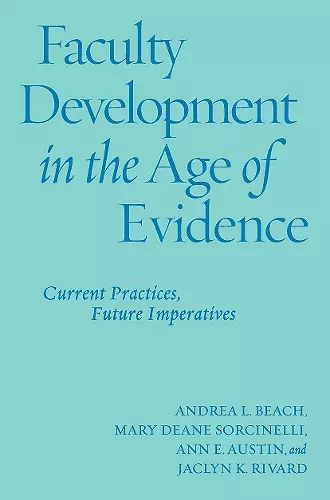Faculty Development in the Age of Evidence
Current Practices, Future Imperatives
Ann E Austin author Mary Deane Sorcinelli author Andrea L Beach author Jaclyn K Rivard author
Format:Hardback
Publisher:Taylor & Francis Inc
Published:1st Nov '16
Currently unavailable, and unfortunately no date known when it will be back
This hardback is available in another edition too:
- Paperback£33.99(9781620362686)

The first decade of the 21st century brought major challenges to higher education, all of which have implications for and impact the future of faculty professional development. This volume provides the field with an important snapshot of faculty development structures, priorities and practices in a period of change, and uses the collective wisdom of those engaged with teaching, learning, and faculty development centers and programs to identify important new directions for practice. Building on their previous study of a decade ago, published under the title of Creating the Future of Faculty Development, the authors explore questions of professional preparation and pathways, programmatic priorities, collaboration, and assessment. Since the publication of this earlier study, the pressures on faculty development have only escalated—demands for greater accountability from regional and disciplinary accreditors, fiscal constraints, increasing diversity in types of faculty appointments, and expansion of new technologies for research and teaching. Centers have been asked to address a wider range of institutional issues and priorities based on these challenges. How have they responded and what strategies should centers be considering? These are the questions this book addresses.For this new study the authors re-surveyed faculty developers on perceived priorities for the field as well as practices and services offered. They also examined more deeply than the earlier study the organization of faculty development, including characteristics of directors; operating budgets and staffing levels of centers; and patterns of collaboration, re-organization and consolidation. In doing so they elicited information on centers’ “signature programs,” and the ways that they assess the impact of their programs on teaching and learning and other key outcomes. What emerges from the findings are what the authors term a new Age of Evidence, influenced by heightened stakeholder interest in the outcomes of undergraduate education and characterized by a focus on assessing the impact of instruction on student learning, of academic programs on student success, and of faculty development in institutional mission priorities. Faculty developers are responding to institutional needs for assessment, at the same time as they are being asked to address a wider range of institutional priorities in areas such as blended and online teaching, diversity, and the scale-up of evidence-based practices. They face the need to broaden their audiences, and address the needs of part-time, non-tenure-track,...
“Overall, Faculty Development in the Age of Evidence is an essential resource for the field of faculty development and for the higher education sector. Beach and colleagues provide an updated examination of the status of the field, and create meaningful arguments in favor of continually strengthening faculty development. Beyond that, the book asks important questions for practitioners to reflect and act upon, in order to continue evolving the field of faculty development and the overall impact of higher education in society.”
Teachers College Record
"Faculty Development in the Age of Evidence: Current Practices, Future Imperatives (2016) is essential for all in the field of faculty development, regardless of years in service, as well as those considering entering the field and those with leadership roles at higher education institutions. The main focus of the text is on “faculty development today—its purposes, the roles of developers, key priorities, and new directions” (Beach et al., 2016, p. 12). This book provides a broad view of who faculty developers are, the work they do, and the work they wish to expand in the future. Each chapter answers a posed question (e.g., What Guides Our Work?), and most chapters end with a conclusion and highlights, making the book conducive for referencing in the future.
Overall, this book depicts a bird’s eye view of a field that continues to grow, gain recognition, and find its place within the structure of higher education institutions. To my knowledge, there is no other literature that provides such a comprehensive overview of the field. This book is an excellent guide for gaining insight into cross-institutional practices and it may help guide developers in planning for the future. Faculty Development in the Age of Evidence: Current Practices, Future Imperatives is a significant addition to the literature on faculty development."
Journal of Faculty Development
ISBN: 9781620362679
Dimensions: unknown
Weight: 417g
176 pages